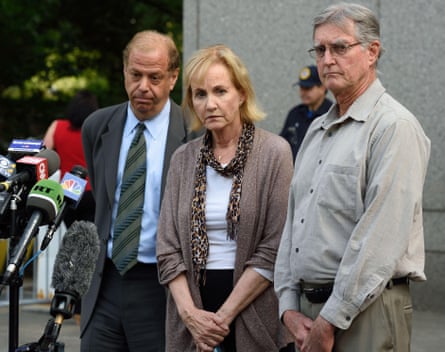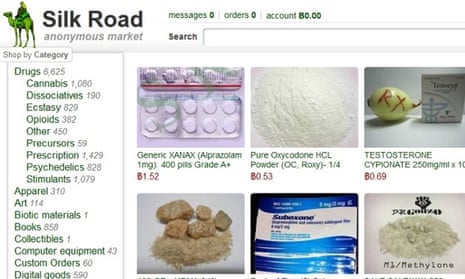One gram of black tar heroin. Price: 0.5 Bitcoins, or around $118.
It is pictured, dark and exotic, next to a needle and a penknife, for scale. Underneath it, users have left rave reviews: “5/5 – Came ridiculously fast. Best stealth, weight on point. Solid product. Perfect purchase as always.”
“5/5 – Even in this chaos he shipped my order fast with great stealth. The product is fire as usual. Thanks.”
“5/5 – 48 hours as usual you guys are super.”
Abutting the heroin is a cornucopia of other drugs and paraphernalia: 20 pills of the concentration drug Modafini ships for for 0.08BTC, or just under $20. A generic 10-pack of the erectile dysfunction drug Cialis, a shade under $30. Two hundred tabs of diazepam – generic valium – $110.
This is Agora marketplace, an online superstore for drugs and other illegal and semi-legal goods and services. It is one of many that have sprung up after the shuttering of Silk Road, the first major darknet market, and the arrest of its founder, Ross Ulbricht, who went by the alias Dread Pirate Roberts.
On Friday in a federal court in Manhattan, Ulbricht was sentenced to life in prison – several times over – with no possibility of parole. In a pre-sentencing letter to judge Katherine Forrest, prosecutors said a harsh sentence would act as a deterrent to others thinking of setting up online markets, and clearly, Forrest agreed.
But however hard the authorities try to slam the stable door, the horse has long since bolted.
When Silk Road was shuttered by the FBI in 2013, it was pretty much the only site of its kind. Buying and selling drugs online was not new – there have always been listings with coded shibboleths on sites like Craigslist in the US and Gumtree in the UK, as ordinary drug-dealing moved clumsily onto the internet.
But Silk Road, founded in 2011, was something else. Using the Tor encryption service and with prices in Bitcoin, it promised a new level of safety – both from law enforcement and from scam artists. Vendors were rated by users, as they are on sites like Ebay; vendors that failed to deliver got bad reviews, so users knew to steer clear.
Libertarian though Silk Road’s philosophy might have been with regard to drugs, it nonetheless operated with a moral code. Child pornography was banned, as were stolen credit cards, weapons and paid-for assassinations – all of which were available on other, murkier dark web sites.
After Silk Road was closed, however, rather than dampen the market, it fragmented it. Dozens of sites sprang up, not all of them operated by the same set of moral codes. Several, including the so-called Silk Road 2.0, which was set up by several administrators of the first site, have since also been raided and shut down. Others turned out to be scams: one, a large marketplace called Evolution, saw administrators exit with more than $12m in Bitcoin.
Despite all this, the market has continued to grow, though because of its fractured nature it is difficult to properly assess its size.
James – not his real name – is the editor of DeepDotWeb, a news site which focuses on darknet marketplaces and maintains an up-to-date list of which markets are on or offline. He said the current market was “WAY bigger” than it was in the days of Silk Road.
James said it could safely be assumed that the daily turnover of the biggest markets – Agora is the largest, followed in no particular order by Nucleus, Middle Earth, Abrax, and Alphabay – is in the order of more than a million dollars a day. He estimated the market cap to be in the “hundreds of millions” of dollars.
“It’s becoming bigger all the time,” James told the Guardian. “Currently there are over 40 markets, forums, private vendor shops and a higher number of product listings than ever. I can personally testify that we, as a site who is reporting the darknet, see more and more traffic from people searching for specific markets – 1000% more than we saw last year.”
He said that since Ulbricht’s arrest people had “lost the sense of being invincible”, but also that they learned from Ulbricht’s mistakes and were now more careful, and more aware both of the dangers of law enforcement and of scams.
On Reddit, the subreddit for darknet markets has almost 60,000 subscribers. Among users asked by the Guardian what they thought the future holds, opinion was split. Many were worried by the instability of the new markets, suggesting that once vendors had enough repeat custom they would move to a direct-deal model rather than advertising on marketplaces that were vulnerable to exit scams. Vendors were the biggest losers in the Evolution exit scam.
But others thought the new order was here to stay.
“As long as our customers understand that purchasing their drugs through a DNM [Dark Net Market] is WAY safer than doing it in person, this will continue forever,” said one user, who gave his name as John. “People aren’t afraid of being robbed, beaten or killed because they went to their corner drug dealer when they can go to a DNM instead.”

“You can’t unring the bell that is being able to buy drugs online,” said another user. “It’s like telling porn fans they can’t watch porn online anymore – they’d find a way. And the governments trying to stop people from buying and selling drugs online are like King Canute trying to hold back the tide.”
One user described the situation as “like the mythical hydra, you cut off one head and more of them grow. There will be more markets, more drugs getting mailed, and overall a safer drug scene, freer from DEA and drug cartel violence”.
On Agora, the “drugs” section has nearly 16,000 product listings – easily as many as Silk Road had in its heyday and perhaps even more. Other sections include weapons and ammunition, forged documents and tobacco. You can buy passwords to pornographic sites, or hire hackers.
On the front page of the site, incongruously nestled between listings for a 20-pack of Modafinil and a tutorial for magic tricks, is a volume titled “Drug Abuse Handbook”. The blurb describes it as “a thorough compendium of the knowledge of the pharmacological, medical, and legal aspects of drugs”.
It costs 0.004BTC – or just under a dollar.

Comments (…)
Sign in or create your Guardian account to join the discussion